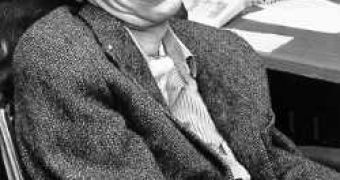Renowned British physicist Stephen William Hawking celebrates today his 66th birthday. The son of a research biologist, Frank Hawking, and Isobel Hawking, Stephen was born in London on the 8th of January 1942. He had two other sisters and an adopted brother. During his time at the St. Albans High School for Girls, between the years 1950 to 1953 (as back in those days girls and boys studied together until the age of 10 after which they were separated), Stephen Hawking was a relatively good student, however he wasn't an exceptional one.
Against the will of his father, which would have liked him to study biology, Stephen enrolled to the University College in Oxford with the intention to study mathematics. Chance made that mathematics was not being studied at the respective institution, thus Hawking chose the next best thing, physics. During the time spent at Oxford, Stephen Hawking started to reveal its genius, surpassing all his fellow students, although he rarely took notes and studied from a handful of books. Nevertheless, his determination always prevailed.
Soon after receiving his B.A. degree in 1962, Stephen Hawking arrived at the University of Cambridge in order to obtain his doctorate in physics. However, fate had another thing in mind, as during his stay in Cambridge he started developing symptoms of a disease called amyotrophic lateral sclerosis, which affects the neuro-motor capabilities in humans. After an incident in which Stephen experienced one of the symptoms, when he fell down the stairs, doctors diagnosed him with the so-called Lou Gehrig's disease, that would disable all his neuromuscular control, and would probably make him survive no less than two or maybe three years.
Hawking quited his attempt to obtain the doctorate mainly due to the doctor's predictions, and married Jane Wilde in 1965 whom he had three children with. He would later state that the marriage between him and Jane represented a real turning point in his life.
While fighting with a terrible disease that was slowly taking over his body, Stephen continued his research into theoretical physics and concentrated more on theoretical cosmology and quantum gravity. Along with Roger Penrose, Hawking demonstrated the exact conditions in which a singularity can exist in the fabric of space-time, with the help of mathematic models extracted from the Theory of Relativity. Four years later, Hawking clearly showed that black holes not only swallow in matter but they also radiate energy through a process we call today Hawking radiation, which predicts that a 'non-feeding' black hole, given an infinite amount of time, would slowly radiate energy and will evaporate into space.
Other notable contributions in the field of theoretical physics include the model of the universe with no space-time boundaries, created along with Jim Hartle. Curiously, the no-boundary universe predicted a closed universe, but, after much deliberation with Neil Turok, they realized that the same model predicted the possibility of existence of a non-closed universe. To give you an idea of the paradox presented by the possibility of existence of an open universe, try to imagine yourself at the North Pole. Now try to imagine walking Norther than the North Pole; its impossible, because there is no boundary there.
In 1975 he embarked into dispute with Kip Thorne and John Preskill, contradicting each other over the black hole information paradox, which states that matter, thus information, passing the event horizon and hitting the singularity, is lost forever, meaning all black holes are exactly identical, except for mass, electrical charge and spin. However, this violates a number of basic physical theories, and the three of them made a bet consisting of the "Total Baseball, The Ultimate Encyclopedia", which will be rewarded to whoever is right. Hawking revised his status regarding the information paradox in 2004 by predicting that information is not lost in black holes, but it is transfered into another ones through the so-called 'wormholes'. He kept his word and awarded the encyclopedia to Prestkill, but the former refused it as, he later declared, he was not comfortable with Hawking's explanation.
Although the disease Stephen suffers with progressed relatively slow, now he is totally paralyzed, being able to move only his eyes and his right cheek. In multiple interviews he stated that he feels rather lucky and happy that the original predictions of the doctors didn't happened. The wheelchair he uses to move around is equipped with a computer that serves the role of voice synthesizer and remote control that he accesses with the help of an infrared sensor located in his glasses.

 14 DAY TRIAL //
14 DAY TRIAL //